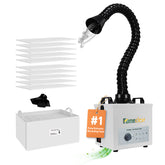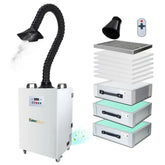Is Soldering Toxic? Here’s What You Really Need to Know
If you've ever worked in PCB repair or electronics assembly, you've probably wondered:
Is soldering toxic? Are solder fumes harmful to your health?
Let’s answer this clearly — yes, soldering can be harmful, especially if you're not using proper protection like a reliable solder fume extractor.
⚠️ Real Concerns from Real Workers
Many people working with electric soldering irons have shared their experiences online.
One user wrote:
"I've been working with soldering for more than a year, and recently I started feeling uncomfortable — my stomach felt bloated and my body just felt off. Could this be lead poisoning?"
This kind of concern is not rare and should be taken seriously.
🔍 So, Is Solder Itself Toxic?
That depends on the type of solder you’re using:
| Type of Solder | Contains Lead? | Toxicity |
|---|---|---|
| Lead-based solder | ✅ Yes | ☠️ Highly toxic |
| Lead-free solder | ⚠️ Trace amounts | ⚠️ Less toxic, not harmless |
Lead is a highly toxic heavy metal. Even low-level exposure can negatively affect your nervous system, reproductive organs, and brain function.
When inhaled through solder fumes, it can lead to clinical lead poisoning over time.
💨 What’s Actually in Soldering Fumes?
Whether you're using leaded or lead-free solder, soldering releases dangerous fumes that may include:
-
Rosin smoke (from the flux inside the solder wire)
-
VOCs (volatile organic compounds)
-
Metal oxide particles
-
Trace lead vapor
-
Zinc chloride or ammonium chloride (from some fluxes)
These pollutants can irritate your eyes, lungs, and throat. Long-term exposure may cause chronic respiratory issues, asthma, or even neurological damage.
🧪 What Do Safety Standards Say?
According to global health standards like GBZ2-2002 and ISO14000:
-
The safe exposure limit for lead fume is extremely low.
-
Many regions (including the U.S. and EU) now legally require fume extraction systems in any soldering workspace.
-
Soldering without proper ventilation or smoke control is considered a workplace hazard.
🛡️ How to Stay Safe While Soldering
Whether you're a DIYer or an electronics professional, here are essential ways to reduce your health risks:
-
✅ Ventilate your space. Use a fan or open windows to keep air flowing.
-
✅ Wear a mask and safety glasses. Block inhalation and protect your eyes.
-
✅ Take breaks. Avoid long exposure by giving your body time to recover.
-
✅ Choose lead-free solder. It’s safer for both you and the environment.
-
✅ Wash your hands often. Never eat or drink after soldering without cleaning up.
-
✅ Consume calcium-rich foods or milk. These may help reduce lead absorption.
-
✅ Most importantly — use a high-quality solder fume extractor.
💡 Why Is a Solder Fume Extractor the Best Solution So Far?
If a machine is called a fume extractor, it should do three essential things:
-
Capture fine dust
-
Eliminate visible smoke
-
Reduce VOCs and remove odors
These pollutants are filtered through a specialized triple-layer filtration system, with each filter targeting a specific type of contaminant:
🌀 1. Dust Filter (Non-woven Fabric)
Captures small dust particles generated during soldering or grinding.
🌫️ 2. Smoke Filter (Fiberglass HEPA)
Traps visible smoke — typically made up of particles sized 10 to 0.3 microns.
🌬️ 3. Carbon Filter (Activated Carbon)
Absorbs volatile organic compounds (VOCs) and the strong rosin-based odors that linger in the air, on clothing, and even on skin.
✅ The Result: Clean Air, Less Odor, and Better Health
By using a solder fume extractor with this triple-filtration system, you can:
-
Remove harmful fumes before they spread
-
Drastically reduce the strong smells that cling to clothes and hair
-
Protect your lungs, reduce headaches, and prevent long-term toxicity
-
Keep your workspace compliant with international safety standards






























Leave a comment
Please note, comments need to be approved before they are published.